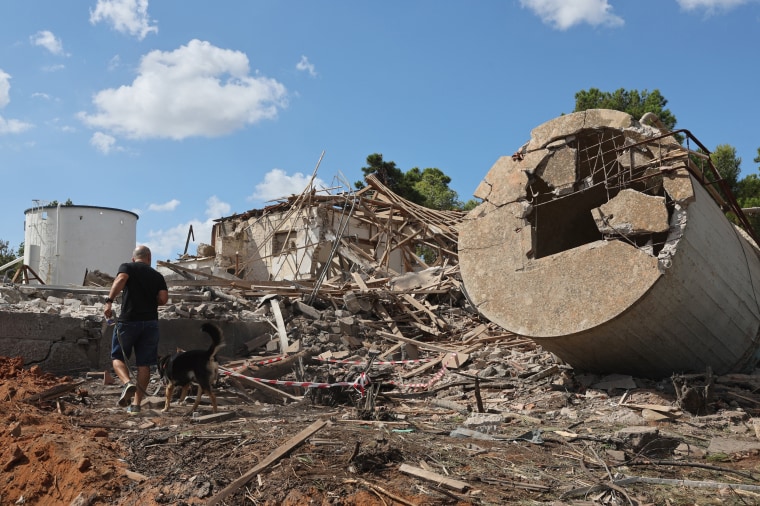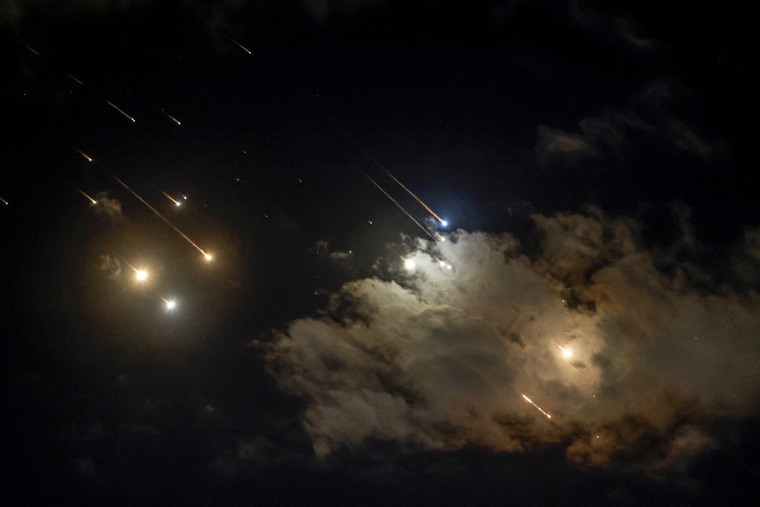Israel has promised to retaliate against Iran’s ballistic missile strike with overwhelming force.
What form that reaction will take is the unsolved issue that hovered over the Middle East on Wednesday: Will it be another step toward full-scale conflict? Might Israel try to attack Iran’s nuclear installations as well as its oil facilities? Or does the United States’ favored diplomacy still have a place?
An Israeli official told NBC News on Wednesday that the nation will respond quickly.

Israel’s military and intelligence chiefs met with Prime Minister Benjamin Netanyahu at the defense ministry to examine possible ways to accomplish this. The source stated that Rosh HaShana, the Jewish New Year, which starts on Wednesday night and is immediately followed by other Jewish holidays, made it difficult to determine the precise timing of the strike.
However, they claimed, Israel is determined to respond swiftly.
As U.N. president António Guterres described this pattern of “escalation after escalation,” the Iranians have already threatened to respond more harshly to any Israeli reprisal. Guterres was deemed “persona non grata” by Israel for his failure to denounce Iran.
The relatively moderate president of Iran, Masoud Pezeshkian, warned his cabinet on Wednesday that the Israelis “will receive a far more crushing response” if they “make a mistake.”
This is precisely the situation that Western governments and experts feared would occur: that Israel’s fight with Iran-backed terrorist groups Hamas and Hezbollah, which began on October 7, would turn into a direct confrontation with Tehran.
As he stated this weekend, Netanyahu has made it apparent that he wishes to alter “the balance of power” in the Middle East. Thus far, this has meant attacking Gaza and destabilizing Hamas before destroying Hezbollah’s leadership, which includes the assassination of its formidable commander Hassan Nasrallah.
Palestinian and Lebanese civilian casualties have suffered greatly as a result of both fronts; local officials report that over 41,000 people have died in Gaza and over 1,000 people—including 100 children—have died as a result of Israel’s bombing assault in Lebanon.
Six months ago, Iran fired missiles at Israel, but Washington talked Israel out of taking a serious reaction. Netanyahu indicated a tougher stance this time.
“Iran made a big mistake tonight — and it will pay for it,” he declared Tuesday after the strike. “The Iranian regime lacks comprehension of our resolve to protect ourselves and exact revenge on our adversaries.”
Israel’s ambassador to the UN, Danny Danon, declared that Iran will “bear the painful consequences,” while Defense Minister Yoav Gallant cautioned that Tehran would “pay a heavy price.”
There are many in Israel and abroad who are pushing for the nation to take advantage of this chance to conduct a massive and historic attack against Iran’s nuclear facilities.
Burcu Ozcelik, a senior research fellow at the Royal United Services Institute think tank in London, told NBC News that such a strike would “mark a new high in the tit-for-tat pattern of escalation, and will likely unfurl a chain reaction of unforeseeable events that will endanger U.S. and Western assets, interests, and personnel in the region.”
She said that there has been a “longstanding debate” among Israeli intelligence and defense officials over whether to get this far. “At this point, Israeli retaliation will be significant, but it might not be the maximalist blow that some Israeli far-rightists are calling for at this time.”
When inquired about last week on whether this line of action was being considered, Netanyahu’s office did not reply to requests for comment.
If not, Israel attacking Iran’s oil refineries might be a possibility.
With 4% of the world’s oil produced, the Islamic Republic ranks seventh in the globe. Ozcelik said, calling this sector the “soft belly of Iran” and the nation’s “arterial economic lifeline,” as “the economy will take a heavy blow without revenue from oil exports.”
Ozcelik and industry analysts speculate that Iran’s next action would be to attack Saudi oil infrastructure, as it was accused of doing by the United States and others in 2019. It may even retaliate by blocking the vital maritime chokepoint in the Strait of Hormuz.
“With a global knock-on effect, this dangerous cascading effect would trigger a spike in oil prices and severe disruptions in the energy supply chain,” stated Ozcelik.
In recent years, the nuclear issue has become more and more important.
Since then-President Donald Trump withdrew from a historic nuclear deal in 2018, Iran has made substantial progress toward developing nuclear weapons. Today, the state possesses all the elements needed to construct a nuclear bomb, making it a “threshold state,” according to the nonpartisan Arms Control Association, a nonproliferation organization with headquarters in Washington, D.C.
Iran has utilized Hezbollah as a deterrent, which is one of the reasons Israel hasn’t yet attacked these sites, according to a recent analysis by Matthew Savill, the director of military sciences at the Royal United Services Institute, a think tank in London.

Now that the threat posed by Hezbollah appears to have decreased, leading voices are urging Israel to act.
Former prime minister Naftali Bennett wrote on X, “We must act *now* to destroy Iran’s nuclear program, its central energy facilities, and to fatally cripple this terrorist regime.” The tentacles of the octopus have momentarily been paralyzed; the head is next. This horrible menace to the future of our children must be eliminated.
The extent to which the United States and its allies may become involved in such a rapidly intensifying battle is unknown. President Joe Biden’s administration claims to have been working nonstop to stop a bigger conflict, but it has been disappointed and caught off guard by the Netanyahu coalition, which seems to be paying less and less attention.
Washington has increased its force levels in the area by hundreds this week, and US warships in the Mediterranean have assisted Israel in downing several of the Iranian missiles fired on Tuesday.
Despite the fact that the US ally has never acknowledged it, most arms analysts estimate that Israel possesses about 90 nuclear warheads of its own.
That automatically makes any conflict with Iran more dangerous.
Researchers simulated a possible confrontation between these two enemies in December of last year, following the terror assault on October 7 that was spearheaded by Hamas and resulted in almost 1,200 fatalities and 250 hostages, as reported by Israel.
Both nations fired nuclear missiles at one another as the war scenario, which was conducted by the Nonproliferation Policy Education Center, a different think group in Washington, came to a conclusion.






